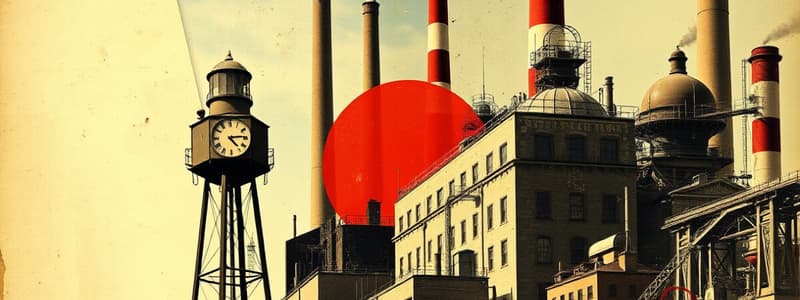Podcast
Questions and Answers
What is the Industrial Revolution?
What is the Industrial Revolution?
- A period of peace and prosperity
- The age of exploration
- A movement to promote animal rights
- A time of dramatic changes in agriculture, industry, and technology (correct)
What period is referred to as the Age of Industry?
What period is referred to as the Age of Industry?
1760 to 1900
What is subsistence farming?
What is subsistence farming?
- Farming with advanced technology
- Growing excess food for trade
- A modern farming technique
- Growing just enough food to feed their own families (correct)
What is the Protestant work ethic?
What is the Protestant work ethic?
What did Jethro Tull invent?
What did Jethro Tull invent?
What significant invention did John Deere patent in 1837?
What significant invention did John Deere patent in 1837?
What innovation did Cyrus McCormick introduce in 1834?
What innovation did Cyrus McCormick introduce in 1834?
What is a thresher used for?
What is a thresher used for?
By 1900, what machines had been combined into one?
By 1900, what machines had been combined into one?
What does the domestic system refer to?
What does the domestic system refer to?
What does the factory system involve?
What does the factory system involve?
What are real wages?
What are real wages?
Who invented the flying shuttle in 1733?
Who invented the flying shuttle in 1733?
What did James Hargreaves invent in 1764?
What did James Hargreaves invent in 1764?
What was Richard Arkwright's contribution to the Industrial Revolution?
What was Richard Arkwright's contribution to the Industrial Revolution?
Who combined the spinning jenny and spinning frame into the spinning mule?
Who combined the spinning jenny and spinning frame into the spinning mule?
What did Edmund Cartwright patent in 1785?
What did Edmund Cartwright patent in 1785?
What effect did the Enclosure Movement have on peasant farmers?
What effect did the Enclosure Movement have on peasant farmers?
What innovation did Eli Whitney create in 1793?
What innovation did Eli Whitney create in 1793?
What did James Watt develop in 1776?
What did James Watt develop in 1776?
The process of rotating crops involves planting a different crop in a field each year, known as ______.
The process of rotating crops involves planting a different crop in a field each year, known as ______.
What does fallow mean in agricultural terms?
What does fallow mean in agricultural terms?
What is the Erie Canal known for?
What is the Erie Canal known for?
What significant trade route was established with the opening of the Suez Canal in 1869?
What significant trade route was established with the opening of the Suez Canal in 1869?
What are Clipper Ships known for?
What are Clipper Ships known for?
What advanced ship technology surpassed clipper ships?
What advanced ship technology surpassed clipper ships?
Who built the first practical steamship?
Who built the first practical steamship?
What year did the Clermont sail 150 miles up the Hudson River?
What year did the Clermont sail 150 miles up the Hudson River?
Who invented the first practical steam-powered locomotive?
Who invented the first practical steam-powered locomotive?
What did Gottlieb Daimler perfect in 1886?
What did Gottlieb Daimler perfect in 1886?
What did Rudolf Diesel unveil?
What did Rudolf Diesel unveil?
What did Karl Benz develop in Germany?
What did Karl Benz develop in Germany?
Flashcards are hidden until you start studying
Study Notes
Industrial Revolution
- A transformative period marked by significant changes in agriculture, industry, and technology.
- Notable advancements and innovations led to increased efficiency and productivity.
Age of Industry
- Spanning from approximately 1760 to 1900, this era experienced remarkable progress in Western Civilization.
- Key developments shaped economic and social structures.
Agricultural Changes
- Subsistence Farming: Farmers produced only enough food for their families, limiting surplus and trade.
- Key Innovations:
- Jethro Tull's seed drill (c. 1701) revolutionized planting methods.
- John Deere patented the steel plow (1837), facilitating more effective farming.
- Cyrus McCormick introduced the reaper (1834), enhancing harvesting productivity by six-fold.
Technological Innovations
- Thresher: Enhanced efficiency in separating grain from chaff.
- Combine: By 1900, combined the functions of reaping and threshing into a single machine.
- Textile Innovations:
- John Kay's flying shuttle (1733) reduced labor for weaving.
- James Hargreaves created the spinning jenny (1764), increasing thread production.
- Richard Arkwright's water-powered frame (1769) specialized in spinning cotton.
- Samuel Crompton combined previous inventions into the spinning mule (1779).
- Edmund Cartwright patented the power loom (1785), mechanizing weaving.
Economic Systems
- Domestic System: Pre-industrial work conducted in small private shops or homes.
- Factory System: Emergence of factories employing numerous workers to produce goods systematically for wages.
- Real Wages: Wages in England increased relative to the cost of living during this period.
Enclosure Movement
- Shifted land use, displacing peasant farmers and allowing landholders to improve livestock quality and productivity.
Innovations in Cotton Production
- Eli Whitney's cotton gin (1793) allowed single workers to replace the labor of fifty, revolutionizing cotton production.
Transportation Developments
- Erie Canal: Completed in 1825, it connected Lake Erie to the Hudson River, significantly aiding trade.
- Suez Canal: Opened in 1869, linking the Mediterranean Sea with the Indian Ocean, facilitating international trade.
- Clipper Ships: Sleek sailing vessels recognized for their speed.
- Steamships: Eventually surpassed clipper ships in speed and efficiency.
Pioneering Figures
- Robert Fulton built the Clermont, the first practical steamship (1807), demonstrating the potential for steam-powered transport.
- George Stephenson invented the first practical steam-powered locomotive, advancing rail transportation.
- Gottlieb Daimler and Rudolf Diesel pioneered internal combustion engines, laying groundwork for future automotive technology.
- Karl Benz developed the first modern automobiles, revolutionizing personal transport.
- Henry Ford's innovations in assembly line production made automobiles more accessible, changing transportation dynamics.
Studying That Suits You
Use AI to generate personalized quizzes and flashcards to suit your learning preferences.




